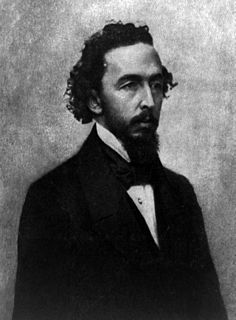A Quote by George Crabbe
When winter stern, his gloomy front uprears,
A sable void the barren earth appears;
The meads no more their former verdure boast,
Fast-bound their streams, and all their beauty lost;
The herds, the flocks, in icy garments mourn, and wildly murmur for the Spring's return;
From snow-topp'd hills the whirlwinds keenly blow,
Howl through the woods, and pierce the vales below,
Through the sharp air a flaky torrent flies,
Mocks the slow sight, and hides the gloomy skies.
Related Quotes
When a poet mentions the spring, we know that the zephyrs are about to whisper, that the groves are to recover their verdure, the linnets to warble forth their notes of love, and the flocks and herds to frisk over vales painted with flowers: yet, who is there so insensible of the beauties of nature, so little delighted with the renovation of the world, as not to feel his heart bound at the mention of the spring?
Weird, isn't it Somehow in the dead of winter when its 40 below, so cold your words just freeze in the air, you think you'll never hear a robin's song again or see a blossom on a cherry tree, when one day you wake up and bingo, light coming through the mini blinds is softened with a tick of rose and the cold morning air has lost its bite. It's spring once again, the streets are paved with mud and the hills are alive with the sound of mosquitos.
Man little knows what calamities are beyond his patience to bear till he tries them; as in ascending the heights of ambition, which look bright from below, every step we rise shows us some new and gloomy prospect of hidden disappointment; so in our descent from the summits of pleasure, though the vale of misery below may appear, at first, dark and gloomy, yet the busy mind, still attentive to its own amusement, finds, as we descend, something to flatter and to please. Still as we approach, the darkest objects appear to brighten, and the mortal eye becomes adapted to its gloomy situation.
Mountains are nature's testimonials of anguish. They are the sharp cry of a groaning and travailing creation. Nature's stern agony writes itself on these furrowed brows of gloomy stone. These reft and splintered crags stand, the dreary images of patient sorrow, existing verdureless and stern because exist they must.
On the way I stood a moment looking out across the marshes with tall cattails, a patch of water, more marsh, then the woods with a few birch trees shining white at the edge on beyond. In the darkness it all looked just like I felt. Wet and swampy and gloomy, very gloomy. In the morning I painted it. My memory of it is that it was probably my best painting that summer.
The holy heaven yearns to wound the earth, and yearning layeth hold on the earth to join in wedlock; the rain, fallen from the amorous heaven, impregnates the earth, and it bringeth forth for mankind the food of flocks and herds and Demeter's gifts; and from that moist marriage-rite the woods put on their bloom.
Announced by all the trumpets of the sky,
Arrives the snow, and, driving o'er the fields,
Seems nowhere to alight: the whited air
Hides hills and woods, the river, and the heaven,
And veils the farmhouse at the garden's end.
The sled and traveller stopped, the courier's feet
Delayed, all friends shut out, the housemates sit
Around the radiant fireplace, enclosed In a tumultuous privacy of storm.




































